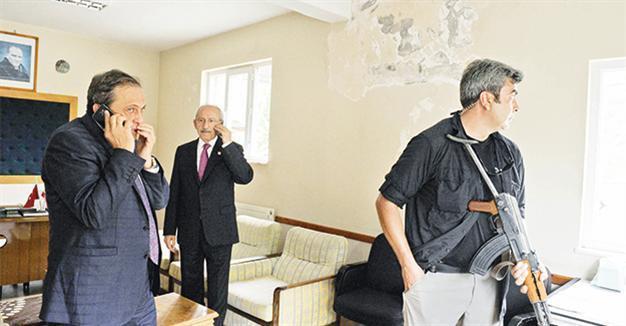Turkish main opposition CHP leader survives PKK attack on motorcade
ARTVİN

AA photo
Main opposition Republican People’s Party (CHP) leader Kemal Kılıçdaroğlu escaped two separate armed attacks staged by outlawed Kurdistan Workers’ Party (PKK) militants, targeting his party’s motorcade in the Şavşat district of the Black Sea province of Artvin on Aug. 25.One gendarmerie soldier who was guarding him was killed by the militants while two others were wounded.
It marked the first ever attack attempt by the outlawed group directly targeting a political leader.
PKK militants first opened fire on piloting gendarmerie vehicles safeguarding the party motorcade from a forested area near the village of Yanıklı, when security forces in three vehicles guarding Kılıçdaroğlu spotted them.
An armed clash erupted between bodyguards and PKK militants as special forces surrounded Kılıçdaroğlu’s vehicle and responded to the fire.
Kılıçdaroğlu and the party committee escaped unharmed in the first attack and he was kept in safety inside his car.
One militant who was preparing to stage a rocket attack on the motorcade was also killed in clashes with security forces, according to reports.
The party committee, which was heading to the Ardanuç district of Artvin, were trying to return when they were targeted once again on their way back to the Şavşat district.
Kılıçdaroğlu was then taken away by a military armed vehicle, first to the highways general directorate and then to the Şavşat District Governor’s Office under heavy protection.
The CHP leader told private broadcaster CNN Türk that he was in a good condition and in a safe place following the attack, expressing his wish that no soldiers would be hurt in the ongoing clash.
“There is one life that God gave. May it be sacrificed for this country and nation. We might have different political views but it is the duty of us all to jointly fight against terror. I will continue my program in the same way,” Kılıçdaroğlu said in a message posted on his party’s website.
He did not cancel his party’s program in the province after the armed attack.
Three soldiers, including two non-commissioned officers, were initially wounded in the attack, Interior Minister Efkan Ala said. However, Fatih Çaybaşı, the soldier who was heavily wounded in his head, later succumbed to his injuries at hospital.
Ala announced that the PKK was the perpetrator of the attack, noting that the group was already active in the region.
“What our friends have said is that it was definitely the PKK. An operation against them has begun. We already had security elements there and an operation was immediately started after such an attack happened,” he told reporters in the capital Ankara.
Ala added that the government saw the attack on Kılıçdaroğlu as an attack targeting everyone, regardless of the aim of the organization.
CHP Deputy Group Chair Özgür Özel said the attack was “preparation for an assassination attempt” using heavy weapons and a rocket launcher.
The number of Kılıçdaroğlu’s bodyguards was increased after warnings of possible assassination attempts and security gaps before the failed coup attempt of July 15. The security of party motorcades was also increased accordingly.
Earlier this week, a group of 40 PKK militants had stormed the Nizamiye district of the eastern province of Tunceli, which is Kılıçdaroğlu’s hometown, on Aug. 22, carrying out a rocket attack on the town’s police station and gendarmerie commandership.
One specialized sergeant was killed and three police officers were wounded in the Nizamiye attack, after which the governor of the province declared a curfew in the town.
In April, the Peoples’ United Revolutionary Movement (HBDH), an umbrella organization formed by nine outlawed groups led by the PKK, outlined its aim to stage attacks, threatening to conduct “political propaganda” targeting the Black Sea provinces.
The PKK staged a gun attack on the motorcade of President Recep Tayyip Erdoğan in May 2011 in the Central Anatolian province of Kastamonu, killing once police officer and wounding two others. The then-prime minister Erdoğan was not in one of the targeted cars in the motorcade as he had instead taken a helicopter.
















